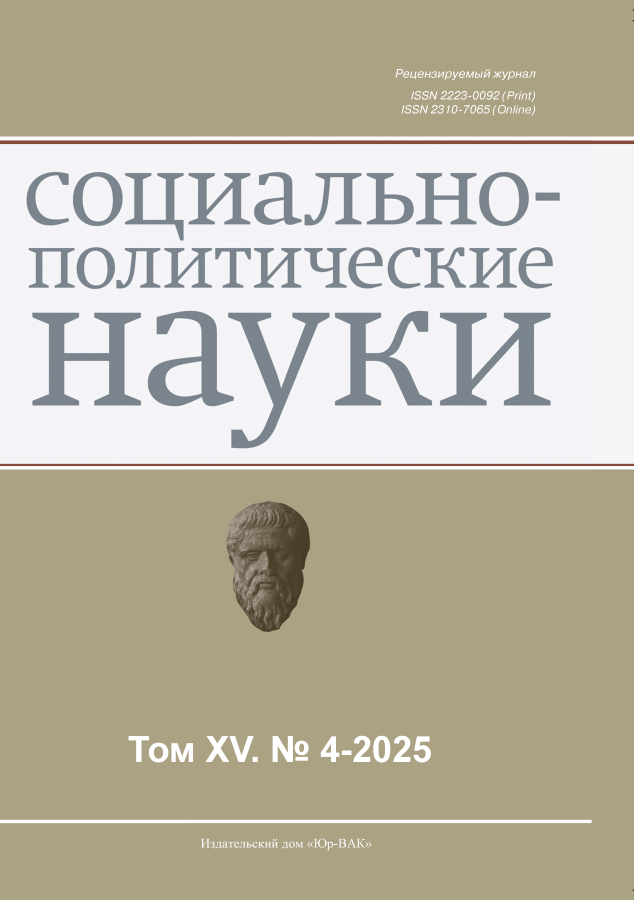Optimizing the interaction between digital media and public administration in the Russian Federation: social, technological and institutional aspects
- Authors: Evloev A.M.1
-
Affiliations:
- State University of Management
- Issue: Vol 15, No 4 (2025)
- Pages: 146-154
- Section: Public Administration and Sectoral Policies
- URL: https://journal-vniispk.ru/2223-0092/article/view/348443
- DOI: https://doi.org/10.33693/2223-0092-2025-15-4-146-154
- EDN: https://elibrary.ru/XFIGAV
- ID: 348443
Cite item
Abstract
The article explores key aspects of the interaction between digital mass media and public administration in the Russian Federation, highlighting the social, technological, and institutional factors that influence their effectiveness. The author analyzes current challenges, including digital inequality, fragmentation of digital infrastructure, and regulatory barriers that hinder transparent communication between the government and society. At the social level, the article emphasizes the need to enhance media literacy and develop inclusive programs to bridge the digital divide. The technological aspect is examined through the lens of data integration (including the “GosTech” platform) and the implementation of algorithms that promote the openness of public services. Institutional analysis focuses on reforming regulatory practices to strike a balance between information control and digital openness. The article is of practical value for government agencies, media experts, and digital governance researchers, offering a comprehensive approach to improving the effectiveness of public communications in the digital age.
Full Text
##article.viewOnOriginalSite##About the authors
Akroman M. Evloev
State University of Management
Author for correspondence.
Email: am_evloev@guu.ru
ORCID iD: 0009-0004-8812-5680
SPIN-code: 8035-1530
junior researcher, Research Institute for Public Policy and Management of the Sectoral Economy
Russian Federation, MoscowReferences
- Abdrakhmanova G.I., Vasilkovsky S.A., Vishnevsky K.O. et al. Indicators of the digital economy: 2022. Statistical collection. Moscow: Higher School of Economics, 2023, 332 p.
- Vatolina O.V., Khyshova T.V., Ligay D.K. Some aspects of the development of the unified digital platform “GosTech”. Issues of Innovative Economy. 2025. No. 1. Pp. 283–294. (In Rus.). doi: 10.18334/vinec.15.1.122416.
- Gadzhiev Kh. A. Political feedback in the context of digitalization of society. Science. Culture. Society. 2021. Vol. 27. No. 1. Pp. 8–20. (In Rus.). doi: 10.19181/nko.2021.27.1.1.
- Jenkins G. Convergent culture: The clash of old and new media. Moscow; St. Petersburg: RIPOL classic; Pangloss, 2019. 381 p.
- Zhuchaev A.A. Digitalization as the main attractor of public power escalation. Law and Order: History, Theory, Practice. 2024. No. 2 (41). Pp. 164–169. (In Rus.). doi: 10.47475/2311-696Х-2024-41-2-164-169.
- Castells M. The power of communication. Moscow: Higher School of Economics, 2023. 591 p.
- Kerimov A.A. The educational potential of social media in the context of the formation of legal culture in modern Russia. Proceedings of the Ural Federal University. Series 1: Problems of Education, Science and Culture. 2021. Vol. 27. No. 4. Pp. 219–228. (In Rus.)
- Korkonosenko S.G., Dunas D.V. The state and the media in the digital environment: New forms of interaction. Mediascope, 2021. No. 3. Pp. 1–18. (In Rus.)
- Kochetkov A.P., Mamichev A.Yu. Russia’s state policy in the digital era: Main trends, scenarios, and regulatory practices. Polis. Political Studies. 2023. No. 1. Pp. 96–113. (In Rus.). doi: 10.17976/jpps/2023.01.08.
- Kuzmina A.O., Minina A.N., Zyuskin A.A. Introduction of new technologies to improve the efficiency and transparency of public administration in Russia. Modern Science: Current Issues of Theory and Practice. 2025. No. 2. Pp. 49–52. (In Rus.). doi: 10.37882/2223-2974.2025.02.13.
- Ligay D.K., Vatolina O.V. The role of digital platforms in the transformation of public administration. Science and Business: Development Paths. 2023. No. 5 (143). Pp. 105–108. (In Rus.)
- Likhotin A.A. Transformation of public administration in the context of digitalization. Management Consulting. 2021. No. 4. Pp. 18–26. (In Rus.). doi: 10.22394/1726-1139-2021-4-18-26.
- Lyakhovenko O.I. Telegram channels in the system of expert and political communication in modern Russia. Galactica Media: Journal of Media Studies. 2022. No. 1. Pp. 111–144. (In Rus.). doi: 10.46539/gmd.v4i1.230.
- Morozova S.S. Digital dialogue: The role of social media and digital platforms in communication between the state and the citizen. Creative Economy. 2025. Vol. 19. No. 1. Pp. 9–30. (In Rus.). doi: 10.18334/ce.19.1.122329.
- Negulyayev S.V. Digitalization of the technopolitics of joint management: The case of the gosuslugi. “Reshayem Vmeste” Platform. Politics and Society. 2022. No. 2. Pp. 37–44. (In Rus.). doi: 10.7256/2454-0684.2022.2.38226.
- Pankratova L.S. The culture of socio-political Internet discussion using bots. Theory and Practice of Social Development. 2022. No. 11. Pp. 53–58. (In Rus.). doi: 10.24158/tipor.2022.11.7.
- Podolskaya T.V., Ulbasheva F.D., Vasyuta E.A. Trends and prospects of using GovTech technologies in the process of digitalization of the public sector. State and Municipal Administration. Scientific Notes. 2024. No. 2. Pp. 147–158. (In Rus.). doi: 10.22394/2079-1690-2024-1-2-147-158.
- Sokolov A.V., Isaeva E.A. Transformation of the interaction between the government and society under the influence of digitalization: The example of the Yaroslavl Region. Bulletin of the Peoples’ Friendship University of Russia. Series: Political Science. 2022. Vol. 24. No. 4. Pp. 686–710. (In Rus.). doi: 10.22363/2313-1438-2022-24-4-686-710.
- Filatova O.G. Discursive practices in the digital public sphere of modern Russia: Results and research directions. Management Consulting. 2019. No. 11. Pp. 180–192. (In Rus.). doi: 10.22394/1726-1139-2019-11-180-192.
Supplementary files








